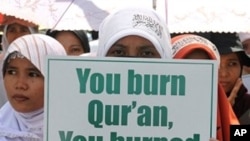The January 14 terrorist attack in Indonesia has again raised the issues of how to combat extremist Islamist ideology and rehabilitate or de-radicalize militants in the world’s biggest Muslim country.
Indonesian police named Bahrun Naim, an Indonesian militant based in Syria with Islamic State militant group (IS), as the principal organizer of the Jakarta attack where eight people died, including four assailants, in multiple bomb blasts and gunfire.
Prior to joining IS, Bahrun Naim studied with Hizbut Tahrir, a conservative Muslim organization that, like Islamic State, opposes the diverse, secular democracy of Indonesia and advocates for the establishment of an Islamic caliphate. Hizbut Tahrir, however, does not support the use of violence to achieve this goal.
Hizbut Tahrir has been banned in a number of countries, but spokesman Muhammad Ismail Yusanto says the same democratic rights that his organization opposes permit them to speak out against the state of Indonesia.
“So Hizbut Tahrir used this loophole and I think as far as we work according to the law, I mean we do not pick [break] the law, we have [the] right to express ideals,” he said.
Yusanto says Bahrun was expelled from Hizbut Tahrir when it was found out he was secretly hiding a weapon.
“He told us that the weapon had been thrown out,” Yusanto said.
Hizbut Tahrir has been called a “conveyor belt to terrorism” by its critics and a peaceful alternative to militant Islam by its defenders.
De-radicalization
The dilemma Indonesia faces in dealing with Hizbut Tahrir illustrates some of the difficulties involved in trying to combat extremist ideologies.
This week, President Joko Widodo called for increased programs to de-radicalize Muslims who have embraced violent extremist beliefs; but, security analyst Evan Laksmana, with the Center for Strategic and International Studies in Jakarta, asks if intolerant ideology is the main driver for terrorism, then should the government target all groups that oppose Indonesia’s democracy?
“Technically the de-radicalization campaign should also target groups like Hizbut Tahrir, right?” he said.
He says Indonesia cannot effectively control what is said in every mosque in the country, but, that the government lacks sufficient data to explain why some Indonesian Muslims join violent Islamist groups.
The main method for rehabilitating Islamist militants in Indonesia is through prison workshops that promote a counter-Islamic ideology and favor tolerance.
These programs, Laksmana says, have often been ineffective.
Prisoners will go along with the counseling and pledge loyalty to the state just to get a reduced sentence.
“Many reports have suggested (they) are simply being used as a transactional method by these terrorists to simply get off easy from prison,” said Laksmana.
At the same time, prisoners can be exposed to violent extremist ideologies and recruited into terrorist groups while incarcerated.
Bahrun Naim served nearly two-and-a-half years in prison for illegal possession of firearms and explosives before he joined IS in Syria in 2014.
Police reportedly believe Bahrun is a supporter of jailed cleric Aman Abdurrahman, who is an influential Indonesian militant. There are also reports that one of the assailants in the Jakarta attack shared a cell with Abdurrahman.
Critics of Indonesia’s de-radicalization efforts say more research is needed to develop an effective program to change hearts and minds. They say the immediate focus of the government should be to isolate possible militant recruiters in prison, prevent Indonesians from joining IS and disrupt and dismantle terror networks before they strike.
Ade Irma contributed to this report.














